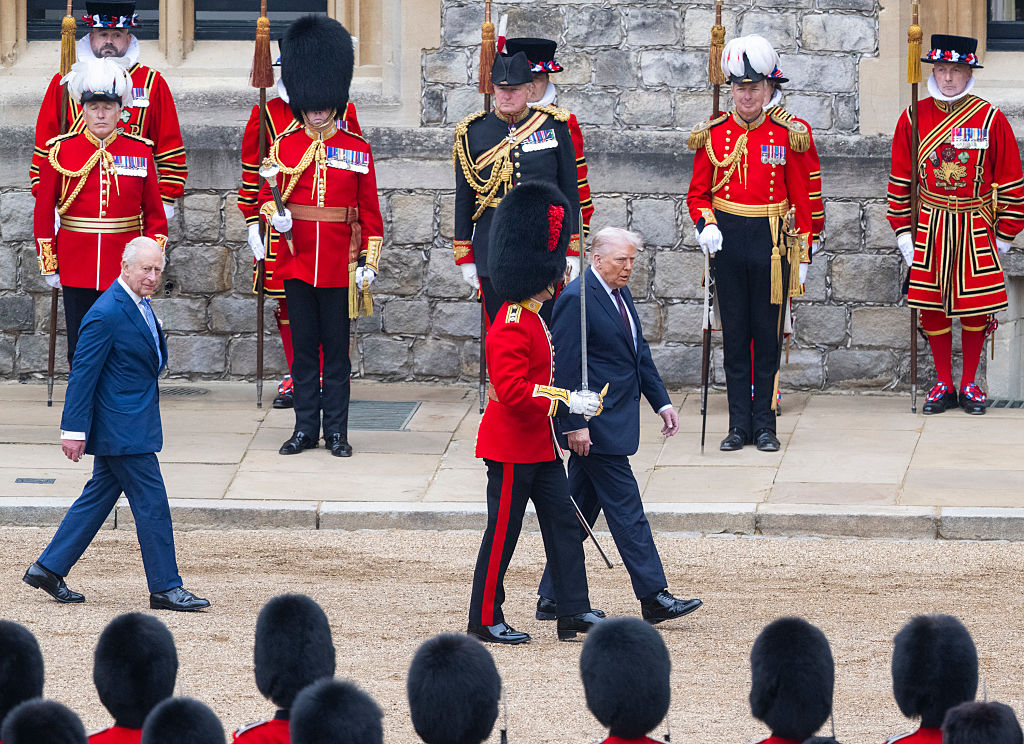A message from the Euractiv
Big news from Brussels: Euractiv has relaunched our free flagship morning newsletter as Rapporteur.
With original reporting from Eddy Wax and Nicoletta Ionta, and backed by 60+ journalists across Europe, Rapporteur delivers sharp, sober, and essential EU political coverage, every weekday at 7am.
Whether you’re in Brussels or beyond, this is your new morning must-read.
——————————————————————————————–
‘Twas a humiliation for the ages – and not only, or even primarily, due to the grotesque, over-the-top display of a golden carriage along with a Hupty-Dumpty cast of soldiers, horses, orchestra members and vast throng of gawking sycophants.
Looking back over last night’s awkward pageantry at Windsor Castle, the opening display turned out to be little more than foreplay. The nadir came during King Charles’ (or “Prince Charles” as Donald Trump addressed him at one point) obsequious dinner speech, in which he did everything to show fealty to the president, short of assuming the position and declaring “Thank you, sir. May I have another?”
Eager to draw in more American investment and win more favourable terms for bilateral trade, the king and his family, in the words of one BBC commentator, rolled out an “absolute full fat reddest of reddest carpets.”
And all it cost Britain and King Charles, who wore the fraught expression of someone being cajoled into a hostage video, was a bit of dignity.
That said, the king couldn’t have been more right when he invoked his “five times great-grandfather” King George III, the British monarch who lost America. “We celebrate a relationship between our two countries that surely neither [George] Washington nor King George III could possibly have imagined,” said King Charles.
You can say that again. Unlike King George, however, Washington would have no doubt been pleased to witness America’s subjugation of its erstwhile colonial master.
But as continental Europeans look on gleefully, they would do well to temper their schadenfreude. As entertaining as the Windsor spectacle might have been to those still bitter over Brexit, the sad truth is that there’s not a government in Europe that could follow the British example, given the chance.
In an era of a leaderless Europe with an economy in perpetual stagnation, the siren call of American investment – not to mention security guarntees – is powerful. Look for Trump to make more trips to Europe to forge new “special relationships”.
To understand what that would mean for the EU, look to Humpty Dumpty.
Roundup
Israel sanctions are “a joke,” says Borrell – The proposed sanctions against Israel come “40,000 deaths too late,” the former EU foreign policy chief said. The measures proposed on Wednesday include suspending preferential trade concessions on Israeli goods and imposing sanctions on far-right ministers and extremist settlers.
EU climate levy centre stage in Czech election – ETS2 requires heating and road transport fuel suppliers to purchase permits for Co2 emissions. But some parties are rallying against the tax, hoping to renegotiate with EU allies and block its implementation in Czechia.
Stopping steel dumping – Brussels wants to team up with the US to expand protections on steel imports as soon as October, trade commissioner Maroš Šefčovič told Euractiv. Through closer cooperation, both the EU and US can tackle the issue of “global overcapacity.”
Across Europe
France budget protests. Encore – More than 800,000 people were expected to protest against budget cuts proposed by former prime minister Bayrou. Thursday’s demonstrations come after outpourings of public anger last week. Public education, air and rail transport, road transport, and the electricity sector were impacted.
Drill, baby, drill, says Icelandic Chamber of Commerce – Business representatives argue that new oil exploration could bring “extraordinary benefits” to the economy. But the government believes Iceland’s future lies in renewables rather than fossil fuels.
Germany budget green light – German lawmakers belatedly approved the government’s 2025 budget, which will channel new sums into military and infrastructure investments. It marks a momentous departure from Germany’s notorious “debt brake” fiscal rules that strictly constrained government borrowing.
Opinion
The Ukraine reparation loan is a test of European resolve – Moscow has long assumed that it can not only win a war of attrition on the battlefield but that it can wear down western unity. A reparation loan would challenge both assumptions, argues Simon Nixon.
